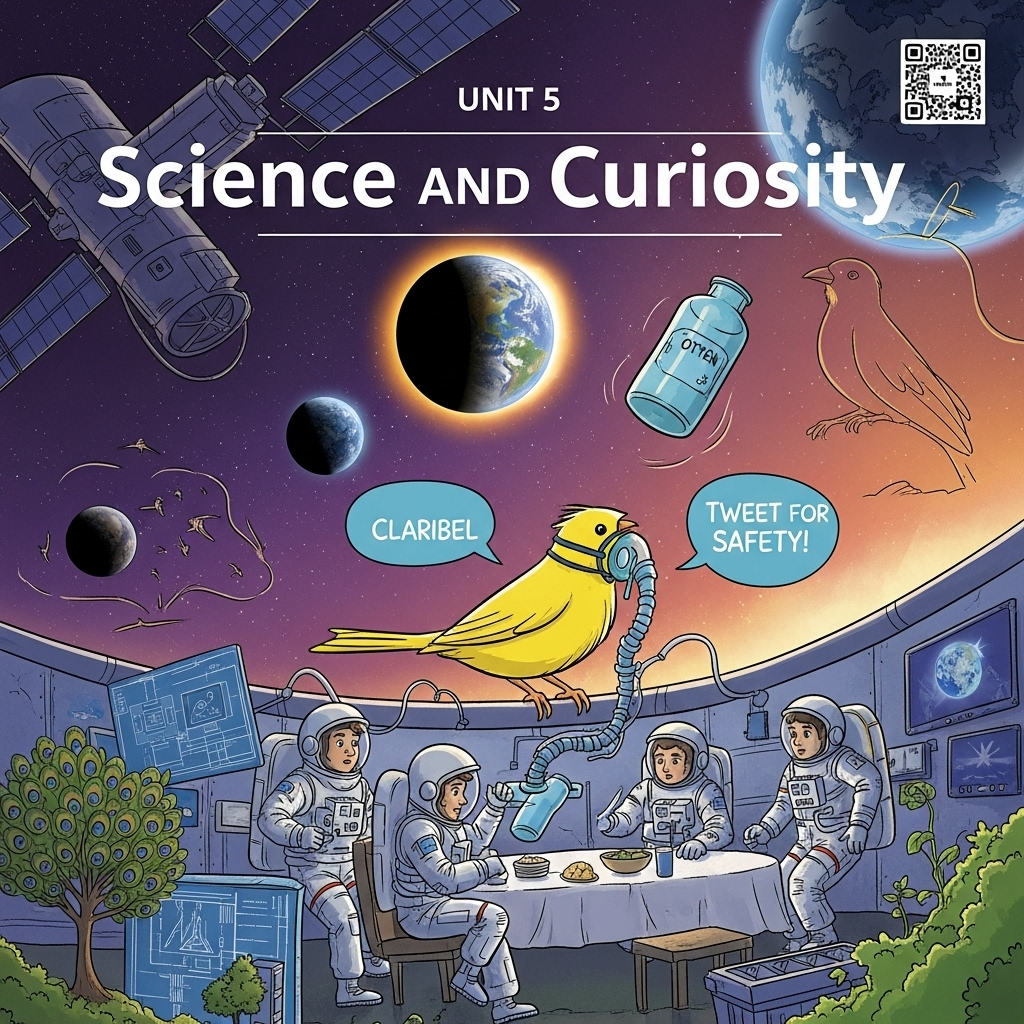Complete Solutions and Summary of Science and Curiosity – NCERT Class 8, English, Unit 5 – Summary, Questions, Answers, Extra Questions
Detailed summary and explanation of Unit 5 ‘Science and Curiosity’ with all question answers, extra questions, and solutions from NCERT Class VIII, English (Poorvi).
Updated: 4 months ago

Introduction
Dive into "Science and Curiosity," where the narrative unfolds with a blend of scientific wonder and human ingenuity. This chapter, continuing from Unit 5, introduces you to the life aboard a space station and the clever ways astronauts adapt to their environment. Through engaging exercises and a thought-provoking story, you'll explore the importance of observation and quick thinking in the face of challenges, all while uncovering the secrets of space exploration.
Summary in English :
"Science and Curiosity" continues Unit 5, delving deeper into the space station narrative with a focus on the crew's daily life and challenges. The chapter begins with vocabulary exercises, enhancing understanding of terms related to space and behavior. The story resumes with the crew on twelve-hour watches, where the narrator wakes feeling unwell, mirroring a disturbed morning on Earth. Sven's distress over Claribel's sudden collapse sparks a collective effort to revive her, revealing her role as an early warning system when the air purifier fails due to an eclipse-induced freeze. The incomplete alarm system heightens the danger, but the crew's quick thinking with oxygen saves the day. The narrative shifts to reflection as the engineer admits the oversight, and the crew shares oxygen in a moment of unity. The story ends on a humorous note, proposing that birdsong in space stations now signals safety, thanks to Claribel's legacy. Discussion questions encourage analysis of the alarm's purpose, the crew's evolving bond with Claribel, and the story's title appropriateness. This chapter blends science fiction with humor, showcasing how curiosity and unconventional solutions, like a canary, ensure survival in space, highlighting life's fragility and ingenuity.
Summary in Hindi
"साइंस एंड क्यूरियोसिटी" यूनिट 5 का अगला अध्याय है, जो अंतरिक्ष स्टेशन पर चालक दल के दैनिक जीवन और चुनौतियों पर गहराई से प्रकाश डालता है। यह अध्याय शब्दावली अभ्यासों के साथ शुरू होता है, जो अंतरिक्ष और व्यवहार से संबंधित शब्दों की समझ को बढ़ाता है। कहानी बारह घंटे की ड्यूटी के साथ आगे बढ़ती है, जहां कथाकार सुबह अस्वस्थ महसूस करता है, जो पृथ्वी पर एक परेशान सुबह की तरह लगता है। स्वेन की क्लैरिबेल के अचानक बेहोश होने की चिंता से चालक दल एकजुट होकर उसे पुनर्जीवित करने का प्रयास करता है, जिससे पता चलता है कि ग्रहण के कारण हवा शुद्ध करने वाली मशीन में खराबी आई थी। अधूरी अलार्म प्रणाली ने खतरे को बढ़ाया, लेकिन चालक दल की त्वरित सोच ने ऑक्सीजन के साथ स्थिति को संभाला। कहानी चिंतन की ओर बढ़ती है जब इंजीनियर अपनी गलती स्वीकार करता है, और चालक दल ऑक्सीजन की बोतल को शांति की पाइप की तरह साझा करता है। कहानी हास्य के साथ समाप्त होती है, जिसमें सुझाव दिया जाता है कि अंतरिक्ष स्टेशनों में पक्षियों की आवाज़ अब सुरक्षा का संकेत है, जो क्लैरिबेल की विरासत को दर्शाता है। चर्चा प्रश्न अलार्म के उद्देश्य, चालक दल के क्लैरिबेल के साथ बदलते रिश्ते, और कहानी के शीर्षक की उपयुक्तता का विश्लेषण करने के लिए प्रेरित करते हैं। यह अध्याय विज्ञान कथा को हास्य के साथ मिलाकर दिखाता है कि जिज्ञासा और असामान्य समाधान, जैसे एक कैनरी, अंतरिक्ष में जीवित रहने में कैसे मदद करते हैं, और जीवन की नाजुकता और बुद्धिमत्ता को उजागर करते हैं।
Thinking about Science and Curiosity - Medium Questions
-
1. The alarm at the space station failed to work properly because they were not connected.
True. The alarm failed because the second alarm circuit was not connected, as revealed by Jim’s assistant, leaving only one circuit operational which did not trigger due to the purifier issue.
-
2. Claribel was brought to the space station for an official experiment on animal behaviour in space.
False. Claribel was not brought for an official experiment; Sven smuggled her aboard out of personal scientific curiosity to observe how a bird would operate in zero gravity.
-
3. The canary’s suffering helped the crew discover a problem with the air purifier.
True. Claribel’s fainting due to the bad air alerted the crew, leading the narrator to realize the air purifier had failed, prompting further investigation.
-
4. The air purifier froze because there was a rare eclipse.
True. The air purifier froze during a rare eclipse by Earth’s shadow, which caused part of it to malfunction and triggered the failure of the single alarm circuit.
-
5. Claribel could fly gracefully in the space station, performing loops in the air.
True. Claribel demonstrated graceful flight by performing a backward loop with leisurely flicks, showing her adaptation to zero gravity.
-
6. The space station crew was uninterested in Claribel and hardly noticed her presence after she was discovered.
False. After her discovery, the crew grew fond of Claribel, treating her as a general pet and relying on her when she alerted them to the air issue.
-
7. Claribel had fainted and had to be revived with oxygen supply.
True. Claribel fainted due to the bad air, and the crew revived her temporarily with an oxygen shot, though she fainted again until the issue was resolved.
-
8. What was the purpose of the alarm? What had caused its failure?
The alarm’s purpose was to detect air quality issues in the space station. Its failure was caused by the second alarm circuit not being connected, and a rare eclipse freezing part of the air purifier, disabling the single operational alarm.
-
9. How does the crew’s reaction to Claribel change over the course of the story?
Initially unaware, the crew became fond of Claribel after her discovery, enjoying her presence. Her fainting and role in detecting the air purifier failure deepened their gratitude, viewing her as a lifesaver.
-
10. What does the last part of the story tell us about the significance of unusual ways of problem solving?
The last part suggests that unusual methods, like using a canary to detect air issues, can be more effective than advanced technology, highlighting the value of creative and unconventional solutions.
Thinking about Science and Curiosity - Large Questions
-
1. Justify the appropriateness of the title of the story.
The title "Science and Curiosity" is apt as it reflects Sven’s curiosity in bringing Claribel to study her behavior in space, and the scientific resolution of the air purifier crisis through her sensitivity, blending both themes effectively.
-
2. ‘Without Claribel, we should soon have been slightly dead.’ What does this line suggest about uncertainty of life in space?
This line indicates the unpredictable dangers in space, such as undetected air quality issues, where even advanced systems can fail, making life fragile and dependent on unexpected aids like Claribel.
-
3. Explain how has the writer presented science fiction with a touch of humour.
The writer blends science fiction with humor by depicting Claribel’s whimsical loops and the crew’s playful explanations for her peeps, contrasted with the serious air crisis, and the humorous ‘pipe of peace’ oxygen sharing, adding levity to the narrative.
-
4. How would Sven reflect on his experience of almost losing Claribel and for saving the lives of the entire crew?
Sven would reflect with relief and awe, realizing his impulsive act of bringing Claribel nearly cost her life but ultimately saved the crew, turning a personal experiment into a heroic legacy.
-
5. Describe the sequence of events that led to the discovery of the air purifier failure and how Claribel played a critical role in it.
The sequence began with Claribel fainting, prompting Sven to seek help. Jock checked her heartbeat, an oxygen shot revived her briefly, and her second faint triggered the narrator’s memory of miners’ canaries. This led to Jim’s investigation, revealing the unconnected alarm and frozen purifier due to an eclipse, with Claribel’s sensitivity being the key alert.
-
6. Analyze how the narrator’s realization about miners’ canaries influenced the outcome of the story.
The narrator’s realization connected Claribel’s fainting to miners’ use of canaries for gas detection, prompting him to warn Jim. This led to the discovery of the alarm and purifier failure, enabling the crew to act and survive, altering the story’s fatal trajectory.
-
7. Discuss the significance of the crew’s action of passing the oxygen bottle around ‘like a pipe of peace’ in the context of the situation.
This action signifies unity and calm amidst crisis, as the crew shared the oxygen while awaiting resolution, symbolizing trust and collective effort to cope with the life-threatening air issue.
-
8. Evaluate the role of the alarm system’s failure in highlighting the importance of backup systems in space.
The alarm’s failure, due to an unconnected circuit and eclipse, underscores the need for redundant backup systems in space, where a single failure can be catastrophic, emphasizing reliability in life-support technology.
-
9. Interpret the phrase ‘sheepish expression’ in the context of Jim’s return after investigating the air purifier.
‘Sheepish expression’ indicates Jim’s embarrassed realization of his oversight, as he returned after confirming the alarm and purifier failure, reflecting his initial confidence being humbled by the truth.
-
10. Reflect on the moral lesson conveyed by the story regarding the value of observation and quick thinking in critical situations.
The story teaches that keen observation, like the narrator noticing Claribel’s fainting, and quick thinking, like recalling miners’ canaries, can be vital in crises, outshining technology and saving lives through alertness.

Group Discussions
No forum posts available.


